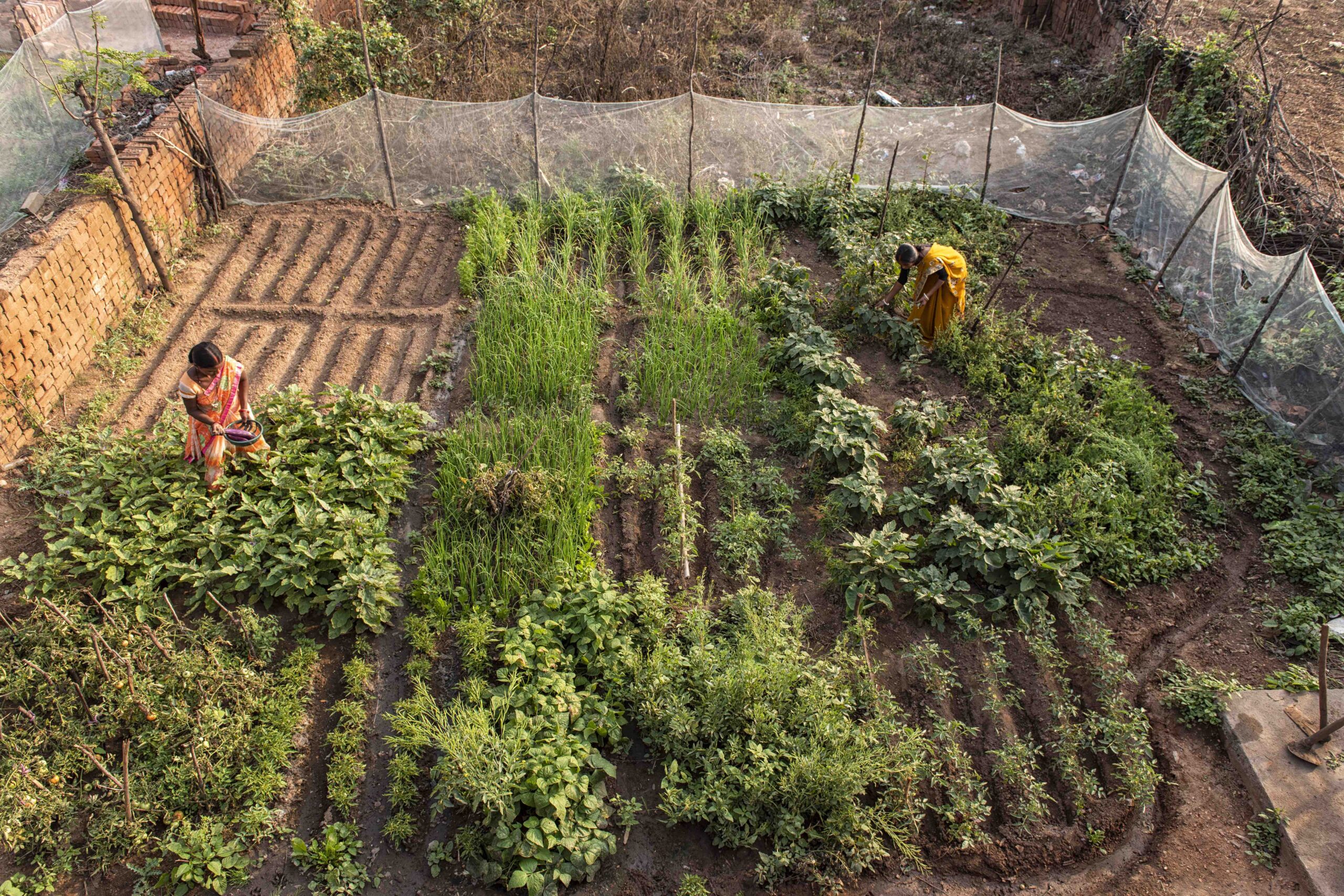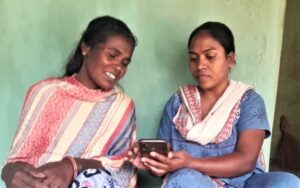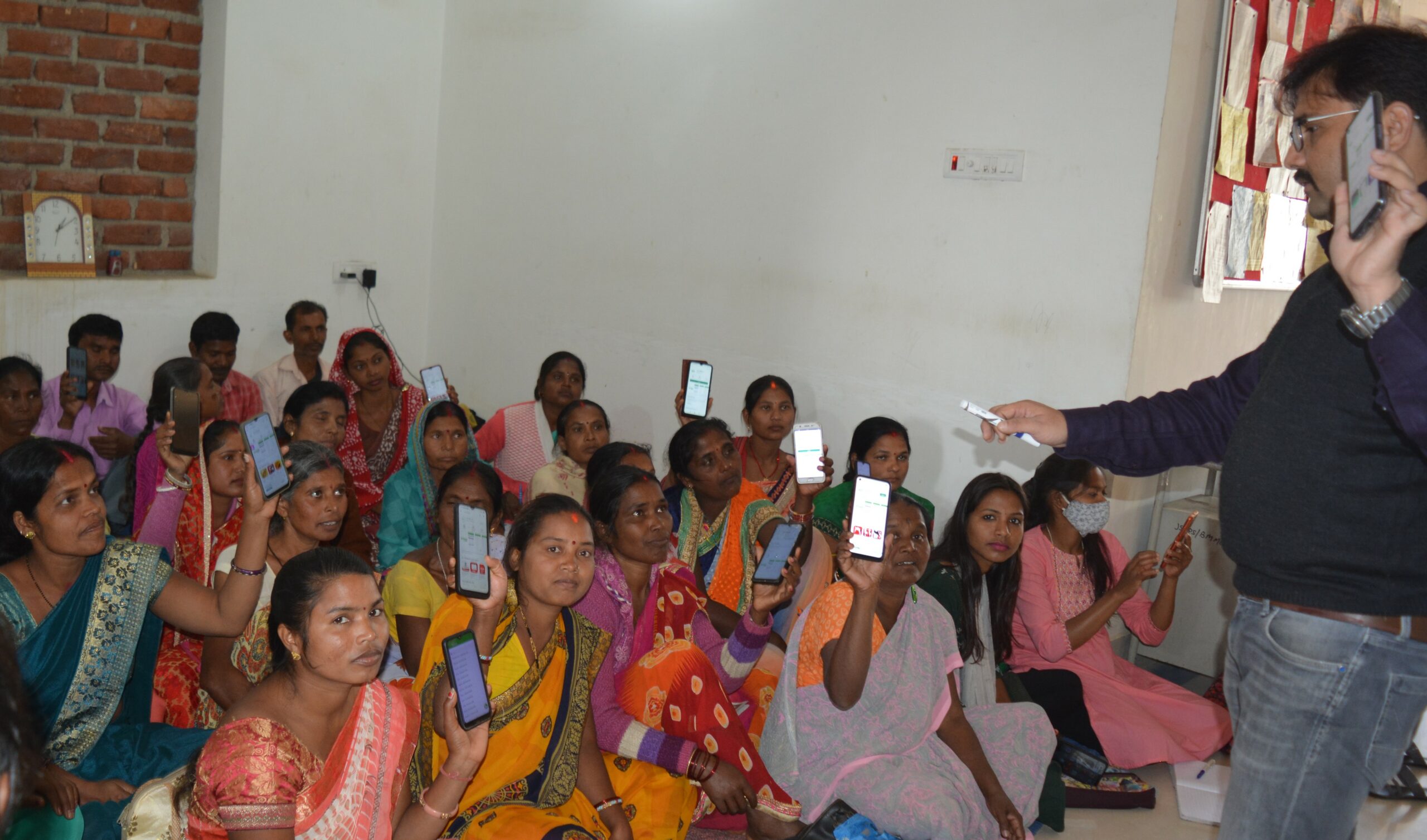To learn more about Digital Green’s AI-powered platform and how it impacts small-scale farmers in India, Ethiopia, Kenya, Nigeria and Brazil, we encourage you to sign up for our newsletter.
When women have agency over their own data: Kisan Diary Enterprise (KDE) in action

Women leaders are a major focus of the ATLAS project. The project pairs scalable and high quality agricultural and post-harvest advisory, and mobile coaching with our FPO strengthening and data sharing solution – Kisan Diary Enterprise (KDE) to enable women leaders to negotiate in the market and fetch competitive prices for women-led producer groups.
KDE is a digital tool that also supports FPOs with buyer discovery and aggregation of commodities for sale in addition to transparent data sharing.
 Sabita Devi, a frontline worker (FLW) in Latehar, Jharkhand, is one such user of KDE. With this application, she keeps a track of the produce being collected or yet to be collected from the member farmers of the village level producer group. She shares that “through this mobile application, maintaining and reporting the produce data to our FPO has become very easy. I collect and feed the data in the mobile app during the meeting with farmers. Through this app, I have access to complete produce data (including the break-up of produce for self-consumption, other commitments, and surplus for selling to producer groups or FPOs) for each of the farmers in one place.”
Sabita Devi, a frontline worker (FLW) in Latehar, Jharkhand, is one such user of KDE. With this application, she keeps a track of the produce being collected or yet to be collected from the member farmers of the village level producer group. She shares that “through this mobile application, maintaining and reporting the produce data to our FPO has become very easy. I collect and feed the data in the mobile app during the meeting with farmers. Through this app, I have access to complete produce data (including the break-up of produce for self-consumption, other commitments, and surplus for selling to producer groups or FPOs) for each of the farmers in one place.”
Pushpa Tigga (Ranchi, Jharkhand) is also using KDE and is quite happy with the ease of inventory management solution that this application offers. She shared “earlier we used to collect the produce data in paper-based formats, in the designated registers within producer groups, which were further shared with the FPO officials. Getting the format xeroxed and reaching all the way to the FPO office for the submission was really a tiring exercise, particularly when these records required very frequent updations, because of the collectivisation of multiple products in a season, with slightly different harvest timelines. Now, we enter the data in coordination with farmers during producer group and village organization level meetings and also visit the farmers in person, and the same data collected could be accessed by the FPO officials on a real-time basis. With this digital tool, our work has gotten easier and we are able to deliver our work more effectively.”
The use of KDE started very recently in Jharkhand and is well-received by the FPOs. FPO managers are very happy to get the digitized data in one place for all of the produce available through different producer groups in their areas. Mr Ankit (Block Program Manager, MKSP-JSLPS, Latehar, Jharkhand) who is the in-charge of Latehar Farmer Producer company shared “Latehar FPO is the nodal FPO in Jharkhand which supplies processed pigeon pea to Palash (a marketing initiative of JSLPS and Department. of Rural Development, Government of Jharkhand). We had a plan of procuring 80 metric tonnes of Mustard and Pigeon pea during this season. It would have really been a challenge to follow up with over 60 producer groups on the same. Thanks to KDE, I am able to track the produce collectivization in one place.
Md. Affan (Block Coordinator, Kolebira-Simdega, MKSP-JSLPS) is responsible for handholding and managing the Kolebira Farmer Producer Company. He mentioned that “Farmers in our area primarily grow paddy, millets and black gram and maize and the FPO is supporting these farmers in marketing the surplus of this produce. Getting the estimates of surplus produce from all the producer groups was a troublesome and time-consuming exercise. With KDE, this has been eased out. We have an FPO-level dashboard, from which we access all the data on a real-time basis. The dashboard provides us with an option to see the producer group-wise break-up of product data, and also has the option to see up to individual farmer level entry, enabling us to quickly follow up with the point person at producer groups.”
Under the ATLAS project in Jharkhand, 6 Farmer Producer Organizations (FPOs) from 4 districts are the focus of our interventions. These FPOs are all women-led FPOs, have a great representation of tribal women members, and are also being promoted under Mahila Kisan Sashaktikaran Priyojana (MKSP), a subcomponent of the National Rural Livelihoods Mission in India aimed at empowering women farmers. In partnership with Jharkhand State Livelihoods Promotion Society (JSLPS), in Jharkhand, Digital Green is worki ng to advance the livelihoods, resilience and self-determination in the Adivasi tribe communities, and foster the recovery from the economic effects of COVID-19 by strengthening women farmer producer organisations and their bargaining power.
ng to advance the livelihoods, resilience and self-determination in the Adivasi tribe communities, and foster the recovery from the economic effects of COVID-19 by strengthening women farmer producer organisations and their bargaining power.
This project is also being implemented in Odisha, and over the life of the project, ATLAS will reach 50,000 women with targeted advisories and improve women’s FPO participation in group sales.
Note: This project is generously funded by the John D. and Catherine T. MacArthur Foundation as part of an initiative to support racial and ethnic justice globally. Digital Green implements this project with the support of various state and district-level agencies.